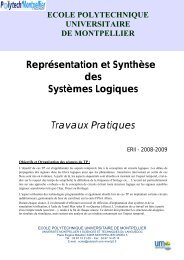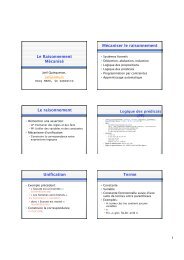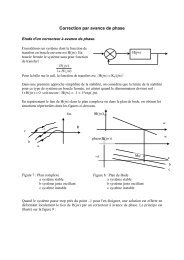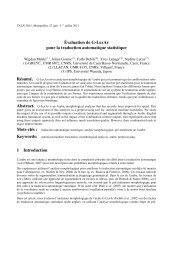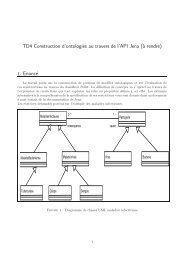Evaluating User Experience in Games: Concepts and Methods - Lirmm
Evaluating User Experience in Games: Concepts and Methods - Lirmm
Evaluating User Experience in Games: Concepts and Methods - Lirmm
You also want an ePaper? Increase the reach of your titles
YUMPU automatically turns print PDFs into web optimized ePapers that Google loves.
5 The Life <strong>and</strong> Tools of a <strong>Games</strong> Designer 81<br />
knowledge, designers are able not only to create a basel<strong>in</strong>e expectation that users<br />
will have for their game, but also to choose certa<strong>in</strong> rules <strong>and</strong> break them. This is<br />
where these heuristics become <strong>in</strong>credibly important; without this basel<strong>in</strong>e, designers<br />
do not have a reference po<strong>in</strong>t def<strong>in</strong><strong>in</strong>g where their concept is novel when compared<br />
to exist<strong>in</strong>g products.<br />
These are all part of the knowledge of a designer. These historical rules are called<br />
up when required. However, they are rarely, if ever formally <strong>and</strong> methodically used<br />
to evaluate a game concept or develop<strong>in</strong>g game.<br />
5.3.2.2 Personas<br />
Personas are archetype users. They represent the target audience of any product.<br />
They are best developed <strong>in</strong> close discussion with market research. When constructed,<br />
a few representative users are def<strong>in</strong>ed with an age, name, hobbies, job,<br />
lifestyle, <strong>and</strong> the k<strong>in</strong>d of software <strong>and</strong> hardware they use (Pruitt <strong>and</strong> Adl<strong>in</strong> 2006).<br />
These archetypes are then the core reference whenever the users’ needs <strong>and</strong> preferences<br />
are discussed. In the same way that the “X” focuses the ideology of the game,<br />
personas focus the target market.<br />
Only recently have personas become <strong>in</strong>creas<strong>in</strong>gly discussed <strong>in</strong> games development.<br />
Discussions on developer-focused websites such as Gamasutra.com have<br />
arisen <strong>and</strong> developers are becom<strong>in</strong>g more aware of personas as a concept. It seems<br />
that as games become more mass market, people who are mak<strong>in</strong>g games feel less<br />
able to def<strong>in</strong>e the audience <strong>and</strong> their likes <strong>and</strong> dislikes. Historically speak<strong>in</strong>g, gamers<br />
made games <strong>and</strong> they know gamers. As soon as the prospect changes to an audience<br />
who are not traditionally gamers, it becomes more difficult for designers to<br />
underst<strong>and</strong> their needs. It seems that personas can fulfill this need for underst<strong>and</strong><strong>in</strong>g<br />
nontraditional users <strong>and</strong> how they would react <strong>and</strong> enjoy the games be<strong>in</strong>g developed.<br />
The power of personas <strong>in</strong> games is much the same as <strong>in</strong> their use elsewhere.<br />
Throughout the process, they provide a focus for user needs. When new features<br />
are suggested or current features prioritized, they are done with reference to the<br />
personas. In this way, they allow designers to evaluate their concepts <strong>and</strong> decisions<br />
based on knowledge of the audience. Questions about fun <strong>and</strong> experience are now<br />
addressed <strong>in</strong> reference to the particular personas created.<br />
The most important factor about personas is that they are a formal def<strong>in</strong>ition<br />
of the audience. All the questions, mentioned earlier <strong>in</strong> the chapter, designers are<br />
ask<strong>in</strong>g about the potential experience are now placed <strong>in</strong> the context of the personas.<br />
Without personas, the types of users imag<strong>in</strong>ed when ask<strong>in</strong>g these questions change<br />
depend<strong>in</strong>g on the decision tak<strong>in</strong>g place. Personas provide a much more clear l<strong>in</strong>e to<br />
evaluate aga<strong>in</strong>st keep<strong>in</strong>g everyone focused on the key audiences.<br />
5.3.3 Production<br />
The product has proved to the bus<strong>in</strong>ess <strong>and</strong> senior stakeholders that it can achieve<br />
the experience that it set out to. Schedules <strong>and</strong> budget are more clearly def<strong>in</strong>ed. All<br />
the game content needs to be developed. The art is polished <strong>and</strong> all bugs elim<strong>in</strong>ated






